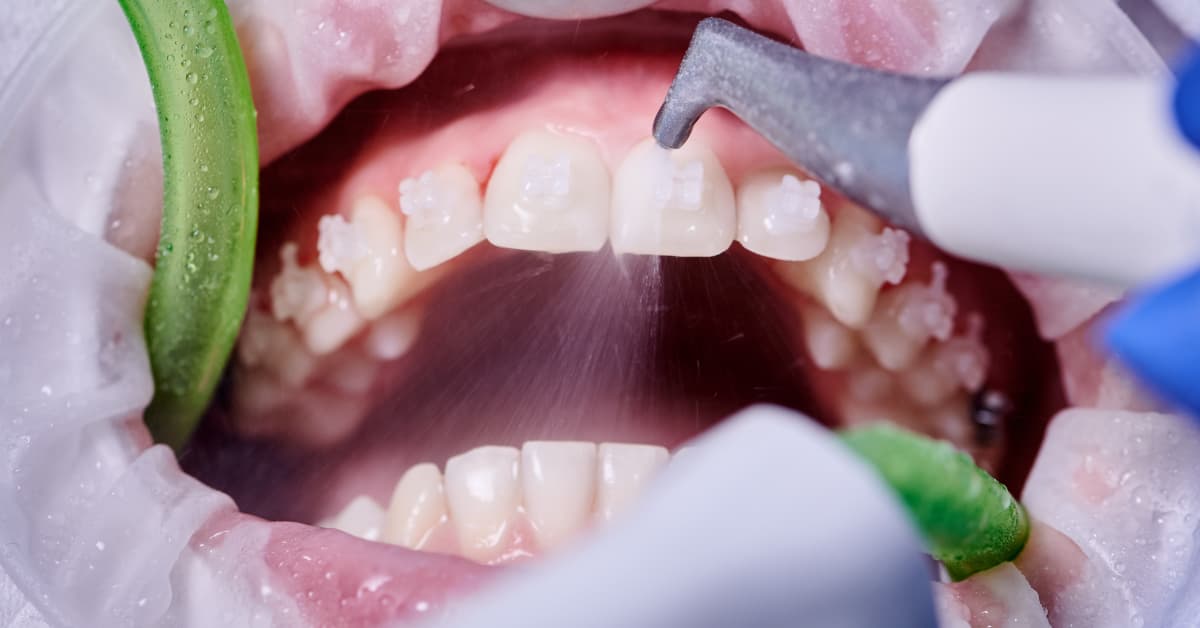Deep Cleaning Teeth: What Every Patient Needs to Know Before Their First Scaling and Root Planing
Are you avoiding that dental appointment and telling yourself your bleeding gums will get better on their own? As someone who has performed thousands of deep cleaning procedures over the past two decades, I’ve seen what happens when patients wait too long, and I’ve also witnessed the incredible transformation that occurs when they finally take action.
Deep cleaning teeth, medically known as scaling and root planing, is a non-surgical periodontal therapy that removes plaque and tartar buildup below the gum line while smoothing tooth roots to prevent future bacterial accumulation. This procedure goes far beyond your regular dental cleaning, targeting the root cause of gum disease before it progresses to irreversible bone loss.
But here’s what most patients don’t understand when they first hear they need this treatment: Deep cleaning isn’t punishment for poor oral hygiene. It’s often the difference between keeping your natural teeth and facing extensive tooth replacement procedures down the road.
When Do You Actually Need Deep Cleaning for Your Teeth?
During my years at Comprehensive Dental Care, I’ve noticed patients often arrive confused about why they need more than a “regular cleaning.” The distinction matters because understanding your specific situation helps you make informed decisions about your oral health.
Bleeding gums during brushing – This isn’t normal, despite what many people believe. When gums bleed consistently, it signals inflammation caused by bacterial toxins below the gum line that regular brushing can’t reach.
Persistent bad breath – That metallic taste or chronic halitosis often stems from anaerobic bacteria thriving in deep pockets between your teeth and gums.
Gum recession – When you notice your teeth appearing longer or feel increased sensitivity, bacteria have likely been attacking the supporting structures for months or years.
Pocket depths exceeding 4mm – During your periodontal examination, we measure the space between your gums and teeth. Healthy pockets measure 1-3mm. Anything deeper indicates the need for intervention.
X-ray evidence of bone loss – Sometimes the damage occurs silently. Radiographs reveal bone deterioration that hasn’t yet created obvious symptoms.
The most important factor? Timing. Gum disease progresses through stages, and deep cleaning is most effective during the early-to-moderate phases before permanent damage occurs.
What Actually Happens During a Deep Cleaning Teeth Procedure
Let me walk you through exactly what occurs during scaling and root planing, because understanding the process eliminates most patient anxiety.
Pre-treatment assessment – We begin with detailed measurements of your gum pockets, noting areas of inflammation and bleeding. This creates a roadmap for treatment and helps us track improvement over time.
Local anesthesia administration – Most patients receive numbing injections to ensure comfort throughout the procedure. The anesthesia targets specific quadrants, allowing us to work thoroughly without causing discomfort.
Scaling phase – Using specialized instruments, we carefully remove plaque and tartar deposits from tooth surfaces both above and below the gum line. This process requires patience and precision, especially in deeper pockets where bacteria have accumulated over time.
Root planing phase – After removing deposits, we smooth the root surfaces to eliminate bacterial toxins and create a clean environment for gum reattachment. This smoothing process prevents future bacterial adhesion and promotes healing.
Irrigation and medication – We flush treated areas with antimicrobial solutions to eliminate remaining bacteria and may apply localized antibiotics in severely affected areas.
The entire process typically takes 1-2 hours per quadrant, depending on the extent of the buildup and the complexity of your case. Most patients complete treatment over 2-4 appointments to ensure thorough results without overwhelming their system.
Deep Cleaning Teeth Pain – What to Really Expect
Every patient asks about pain levels, and I understand why. Previous dental experiences, combined with uncertainty about the unknown, create significant anxiety.
Here’s the reality: Modern deep cleaning procedures involve minimal discomfort when performed correctly. The numbing medication eliminates sensation during treatment, though you’ll feel pressure and movement as we work.
During the procedure – With proper anesthesia, most patients report feeling only gentle pressure and vibration from the instruments. Some describe it as “interesting” rather than painful.
Post-treatment sensitivity – As the numbness wears off, you may experience mild tenderness in treated areas. This typically peaks within 24-48 hours and gradually subsides as healing progresses.
Managing discomfort – Over-the-counter pain medications effectively control any post-procedure discomfort. Most patients find ibuprofen particularly helpful due to its anti-inflammatory properties.
When to call the office – Severe pain that worsens after 72 hours, signs of infection, or bleeding that doesn’t respond to gentle pressure require immediate attention.
The key insight? Pain from untreated gum disease ultimately exceeds any temporary discomfort from deep cleaning. Patients consistently tell me they wish they’d addressed the problem sooner.
Deep Cleaning Teeth Cost – Investment vs. Alternative Treatments
Cost concerns prevent many patients from proceeding with necessary treatment. Let me break down the financial reality and help you understand the bigger picture.
Typical deep cleaning investment ranges from $150-300 per quadrant, with most patients requiring 2-4 quadrants of treatment. Insurance often covers 50-80% of periodontal therapy costs when medically necessary.
Factors affecting cost include the severity of your condition, the number of appointments required, the need for additional medications, and your specific insurance coverage.
But here’s what matters more than the initial investment: What happens if you delay treatment?
Progressive treatment costs escalate dramatically:
- Advanced periodontal therapy: $1,000-3,000+ per quadrant
- Surgical intervention: $2,000-8,000+ depending on complexity
- Tooth replacement after loss: $3,000-6,000+ per implant
Hidden costs of delay include:
- Increased appointment frequency for maintenance
- More complex procedures requiring specialist referrals
- Potential tooth loss leading to expensive replacement options
- Overall health complications from chronic oral infection
Most patients discover that investing in deep cleaning today prevents significantly higher expenses later. We offer payment plans and financing options to make necessary treatment accessible when your oral health depends on it.
Deep Cleaning Teeth Recovery – Your Roadmap to Healing
Recovery from scaling and root planing requires active participation to achieve optimal results. Based on thousands of cases, patients who follow specific guidelines heal faster and maintain better long-term outcomes.
First 24 hours – Avoid hard, crunchy, or spicy foods that might irritate treated tissues. Stick to soft foods like yogurt, smoothies, soup, and pasta. Rinse gently with warm salt water (1/2 teaspoon salt in warm water) every 2-3 hours.
Oral hygiene modifications – Resume gentle brushing the day after treatment using a soft-bristled toothbrush. Focus on plaque removal without aggressive scrubbing. Replace your toothbrush after treatment to eliminate accumulated bacteria.
Healing timeline expectations:
- Days 1-3: Mild tenderness and sensitivity peak, then begin improving
- Week 1: Gum inflammation starts reducing noticeably
- Weeks 2-4: Tissues continue healing and reattaching to cleaned root surfaces
- 6-8 weeks: Follow-up appointment to assess healing and measure improvement
Warning signs requiring immediate attention include severe pain increasing after 72 hours, pus or discharge from treated areas, fever, or excessive bleeding that doesn’t respond to gentle pressure.
The most important recovery factor? Consistent daily oral hygiene. Patients who maintain excellent plaque control experience dramatically better healing and long-term results.
Why Choose Comprehensive Dental Care for Your Deep Cleaning Treatment
Not all periodontal therapy delivers the same results. After two decades of performing these procedures, I’ve learned that success depends on technique, technology, and genuine patient care.
Advanced diagnostic technology – We use digital imaging and precise measurements to create customized treatment plans addressing your specific needs rather than generic approaches.
Gentle, thorough technique – Our systematic approach ensures complete plaque and tartar removal while minimizing tissue trauma and post-treatment discomfort.
Comprehensive follow-up care – Your healing doesn’t end when you leave the office. We monitor your progress closely and adjust maintenance schedules based on your individual response to treatment.
Local expertise you can trust – As Henderson and Las Vegas residents ourselves, we understand the unique oral health challenges our community faces and tailor our approach accordingly.
Most importantly, we explain everything clearly. You’ll understand why treatment is necessary, what to expect during each phase, and how to maintain your results long-term.
Take Action Before Gum Disease Progresses Further
If you’re experiencing bleeding gums, persistent bad breath, or sensitivity that wasn’t there before, waiting won’t improve your situation. Gum disease progresses silently but relentlessly, and the window for non-surgical treatment narrows with time.
Schedule your comprehensive periodontal evaluation today. During this appointment, we’ll measure your gum pockets, assess the extent of any damage, and create a personalized treatment plan that addresses your specific needs and concerns.
What you’ll receive:
- Detailed explanation of your current oral health status
- Clear treatment recommendations with a timeline and cost estimates
- Answers to all your questions about the procedure and recovery
- Flexible scheduling options that work with your lifestyle
Don’t let anxiety or cost concerns prevent you from getting the care you need. We offer multiple financing options and will work with your insurance to maximize your benefits.
Contact Comprehensive Dental Care today to schedule your consultation. Your future self will thank you for taking action today rather than waiting until more extensive treatment becomes necessary!
Remember: The best time to treat gum disease is now – before it progresses to irreversible damage. Every day you wait is another day bacteria continue attacking the structures supporting your teeth.



